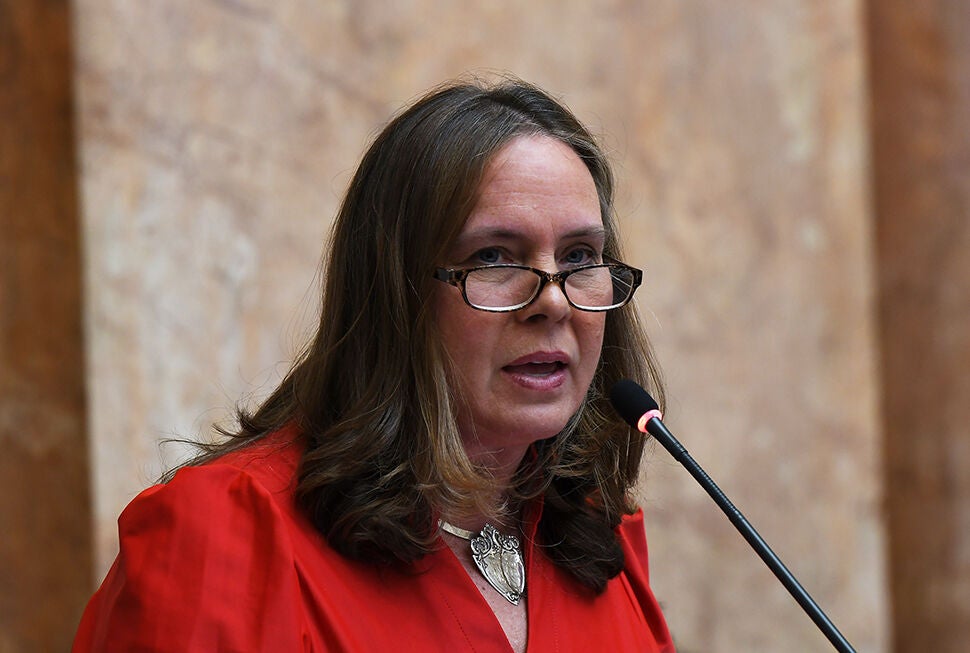Legislature approves school choice, may appear on ballot
Published 4:06 pm Monday, March 18, 2024

- House Majority Caucus Chair Suzanne Miles, R-Owensboro, presents House Bill 2, a proposed constitutional amendment related to education funding, on the House floor Wednesday. (Legislative Research Commission)
In November, Kentucky voters may decide whether they want state funds to go to non-public schools.
Last week, the General Assembly passed a proposed constitutional amendment that would open up more school choice opportunities in the commonwealth.
The House and Senate reached the three-fifths vote thresholds required to pass a constitutional amendment, albeit more narrowly in the House, where several Republicans joined in opposition.
Rep. Suzanne Miles, R-Owensboro, sponsored House Bill 2.
How would HB2 amend the Kentucky Constitution?
To amend the constitution, legislators must take an extra step – getting a majority of voters to approve the amendment on the ballot.
HB2 would change seven sections of the Kentucky Constitution, including the section establishing the legislature’s responsibility to “provide for an efficient system of common schools,” which typically is interpreted as public schools.”
It would also amend sections that currently allow the state to raise taxes only for public purposes, to raise educational money solely for common schools and prohibit the state from giving money to religious schools. HB2 would amend the constitution to allow the state to grant charters.
If it makes it onto the ballot, the ballot question would read:
“To give parents choices in educational opportunities for their children, are you in favor of enabling the General Assembly to provide financial support for the education costs of students in kindergarten through 12th grade who are outside the system of common (public) schools by amending the Constitution of Kentucky as stated below?”
Miles emphasized at several points during debate that the passage of the amendment in itself does not establish any specific policy or including any funding. It only opens up that possibility in future sessions.
How did we get here?
The fight for school choice is not new in the commonwealth.
In 2021, House Bill 563 attempted to make several changes to Kentucky education.
One change that stuck required school districts to allow students from outside the district to attend their schools. This open enrollment policy would ensure that non-resident students counted toward daily attendance, which partially determines state funding.
Another attempted change was unanimously struck down by the Kentucky Supreme Court in 2022. The law tried to create educational opportunity accounts, a process by which people could earn tax credits for contributing to a tuition assistance fund for private schools.
A 2023 court ruling further hindered the legislature’s efforts. After the General Assembly passed a law establishing a funding mechanism for charter schools, Franklin Circuit Court Judge Phillip Shepherd ruled that the law was unconstitutional.
Shepherd wrote that common schools did not include “privately owned and operated schools that are exempt from the statutes and administrative regulations governing public school education,” and therefore, the state could not fund them.
Now, the legislature is looking to avoid future lawsuits by changing the constitution altogether. If voters approve, the legislature would be free to discuss, debate and pass any school choice legislation it deems necessary.
What are supporters and opponents saying about HB2?
Eddie Campbell, the president of the Kentucky Education Association, is not a fan of this constitutional amendment, which he said is “opening the door for public tax dollars to stream into unaccountable private institutions with no public oversight.”
Campbell argued the school choice Kentucky already has – allowing parents to send their students outside of their district – is enough.
He would rather legislators focus on lifting up struggling public schools with more resources for educators and smaller class sizes than create an entirely new system that would potentially divert resources away from public schools.
Jim Waters, president of free-market think tank Bluegrass Institute, said there’s no evidence that funding alone would close much-publicized achievement gaps in public schools.
He believes giving parents more choice would.
“Every child is different,” Waters said. “Every child has different needs. And we think that the parent ought to be able to decide what is a high quality education for their child. And I think there’s gonna be a lot of kids that public schools meet that standard, but there’s gonna be some that need something else, something different.”
Rep. Rachel Roarx, D-Louisville, called HB2 “Pandora’s box.” Fellow Louisville Democrat Rep. Josie Raymond labeled it a “blank check” the legislature is asking Kentucky voters to give it without fully explaining what they might do with it.
Rep. James Tipton, R-Taylorsville, said supporters and opponents would have plenty of time to advocate for their positions between now and November.
Raymond added that private school vouchers, one potential form of school choice, would not allow poor kids to escape public schools.
“Families of means who have already chosen private school are using vouchers across the country as coupons,” Raymond said. “Measures like House Bill 2 seek to divide our kids by race, place and faith. Every child in the commonwealth deserves a great school, regardless of zip code, race, faith, family income or whether their parent wants to fill out a voucher application.”
Rep. Chris Fugate, R-Chavies, said he could not support the amendment until public school needs are met, particularly in eastern Kentucky, an area hit hard by natural disasters and poverty.
Rep. Ashley Tackett Laferty, D-Martin, agreed. She said the focus should be on public schools, not private schools.
“Every week on this floor, we talk about the desperation of our public schools,” she said.
“They’re in desperate need of student safety. They’re in desperate need of substitute teachers. They’re in desperate need of better attendance and they’re in desperate need of teacher raises. Really, what our public schools are in desperate need of is funding.”





